They splay at a bend of the road, rifles slung, the
shadows minimal, their hands tugging their slings by
the upper swivel to ease the routine of the march.
They have been moving since morning, and over each
has descended that singleness, mournful and
comatose, which is the mysterious gift of the march.
Their helmets shadow their eyes, their chinstraps
dangling. In the raddle of grasses their solitude
floats in a drift of identities, a common melancholy.
A captain enters the frame at the head of his
company. His face flashes. With his left hand he tilts
back his helmet, while with his right he draws the
length of an elbow across forehead and nose, his
stained armpits showing dark. A bracelet flashes
behind him. The column recedes, rifles close over the
canted belts, moving up, the packed backs vulnerable:
(Cut)
Late afternoon. In the half-light a handful of blazing
sticks, four infantrymen heating mess tins over an
eddy of smoke, a fifth on his hams, his eyes upcast
from the rim of his metal cup. Nearby a corporal
works a patch into the chamber of his rifle;
he repeats four syllables and smiles sleepily into
the camera. The camera moves to the bivouac area;
a group, their meat-cans close to their mouths,
spooning the compost, Chinese-fashion, and clowning
between mouthfuls. Very close. Their jaws,
lightly bearded, the necks in their jacket collars
strained in an easy horseplay, the Adam’s apples
rapidly raised and released in the human exertion
of eating. In deep shadow, the light failing,
very close. A private tugs at his boot by the toe
and the round of the heel. Deliberately, he draws
the boot clear of his foot, sets it aside with deep
satisfaction, massages his instep over a maternal
thickness of socks. He bends toward the other foot,
camera-shy, a half smile breaking;
(Cut)
It is not yet possible to distinguish the forms
behind the camouflage netting. They move in the
central darkness of the gun, stacking shells and
bringing up powder charges. Only the bulk of the
howitzer is sure, the gun-barrel crossing the line
of the valley under the tented netting.
A village is burning in the valley. In the watery light,
smoke deepens over three hearthbeds of brightness.
A spire. A siding. A ladder of rooftops.
The gun fires. The picture trembles.
(Cut)
An iron darkening.
The hip of a tank darkens a frame,
foreshortened, the treads close to the lens,
a rushing of hammers, rings. The lens is cleared.
A cobbled street. A row of country-houses,
walled. A rosebush in the heavy light, blown
forward. Dust falls in the afterdraft,
a grain at a time. The camera is watchful.
A rifleman moves up the frame, his rifle at low port,
his shadow buffing the cobbles, crouched. He pauses
under the rosebush, his rifle hiked. A second figure
breaks through the frame, freezing between the
foreground and the far doorway. The man under
the rosetree sights carefully. The second man listens.
He raises his rifle, barrel backwards, and brings
the butt down heavily on the door-panels.
The rifle rebounds.
He measures a second blow, his teeth bared
slightly in a reflex of anxiety. His eye is large.
The butt-plate smashes over doorknob and lock,
the knocker flies upward once, the panel splinters
all at once. The man kicks the door open easily
with a booted foot. He listens, bent toward his
rifle-sights. He signals to the second man and enters
the doorway, stooped like a man entering a cave—
(Cut)
Brightness through trees. A damascene.
At the edge of a clearing, a parked jeep.
Two medical corpsmen lash litters to the jeep
engine a few hundred yards behind front lines.
The litter-poles enter the lens over the arch
of the engine. On the litter, a swathed head, a shock
of broken hair, motionless, a fall of blankets.
The stretcher-bearers vault lightly to their seats
and move off at a crawl.
Roadmarker: Battalion Aid Station. A corner of
charred wall, rubble, glass, timber. Legend: Épicerie.
The stretcher-bearers dismount.
The film is bad.
Presently a gloved hand in a surgeon’s sheath,
holding a forceps. Briskly the hand moves over a
circlet of maimed flesh noosed in a bloody bandage.
A scalpel flashes between the living hand and the
human hurt, forcing the rind of the wound,
filling the frame. The camera submits, framing
the wound like a surgeon’s retractor, its gaze
nerveless and saline. The gauzes blacken swiftly,
too heavy for the jaws of the forceps....
The surgeon at full figure. A breeze finds the fold
of his tunic. In the distance the litter-bearers are
leaning for the litter-poles. His eyes hold the optical
center of the lens, unanswered. His mouth rejects
contemplation, not yet relaxed. His hands are void
in their glimmering cicatrix of rubber.
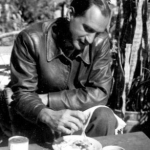
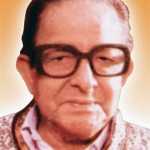
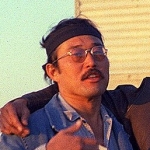
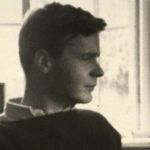
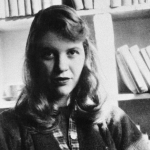

Comment form: